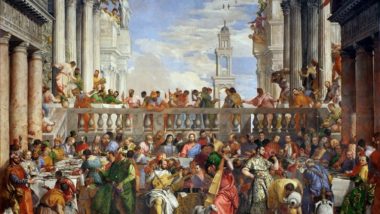
Love Your Neighbour as Yourself
30th Sunday in Ordinary Time – Year A
Fr. David Reitzel
Preached: Sunday Oct 19, 2017
Many of us, including myself, were taught from a young age that Jesus’ command to love God with your whole heart, and love your neighbour as yourself is the central message of the Christian faith. I was taught that this was a radical new teaching that threw the Jewish authorities into a fit. It was extreme in its simplicity, that all we need to do is love, and it was extreme in its demands that we not only need to be nice to our neighbour but love them as much as we love ourselves. This is at least what I was taught. But the truth is, what I was taught . . . was completely wrong.
When Jesus said that the two greatest commandments were to love God and love neighbour, he was not saying anything new, in fact, he was saying something old, . . . very old, . . . like 1500 years old. You see Moses had already said this to Israel after he had led them out of Egypt. In Deuteronomy he tells them, “Hear, O Israel: Love the Lord your God with all your heart and with all your soul and with all your strength” (Deut 6:5). And even before that in the book of Leviticus, Moses tells them: “love your neighbor as yourself” (Lev 19:18). That’s word for word what Jesus said to the lawyer. No, Jesus was not giving a radical new teaching. He was only telling the people what was already in the Old Testament, something they already knew, and they did know it. For in Luke’s account of this conversation between Jesus and the Lawyer, he has the roles reversed: Luke has Jesus ask the lawyer, what is the greatest commandment? And the lawyer answers, love God with your whole heart and your neighbour as yourself. The lawyer knew. So did all the Jewish authorities, these two commandments were standard teaching in the Jewish synagogues.
So if this teaching wasn’t, new, or special or radical, then why did it silence his opponents? Why do we as Christians feel compelled to proclaim that these two commandments are the centre of the Christion faith? I mean we share these commandments with the Jewish faith.
Well it’s not the commandments that were new, it wasn’t the love of God or neighbour that shocked people. The amazement and attraction to our lord’s words centred around one question, “who is my neighbour?
And in Luke’s account, this is exactly what the Lawyer askes next. Who is my neighbour?
If you were to ask a Jewish person in the time of Jesus who is your neighbour, they would say, that’s easy, its other Jewish people. The nation of Israel saw itself as a family united by a common ancestry, a common faith, and a common homeland. They were each other’s neighbour, and therefore their obligation to love extended only to each other, and no further. If you were not a member of the family, you were not a neighbour. If you abandoned the faith, your were not a neighbour. If you intermarried, you were not a neighbour. And if you were not a neighbour, the there was no obligation to love you.
One such group of people were the Samaritans. These were a people who once belonged to the family of Israel, but through a series of political struggles, foreign interventions, intermarriage, and a slight change in the practice of their religion, had been cut off. The Samaritans were once Jews, but in the time of Jesus, they were no longer a part of the family.
So when Jesus responded to the lawyers question: who is my neighbour, by telling the parable of the good Samaritan, he was making a point. It is sad that the Gospel today doesn’t include the parable, because it is the reason why Jesus’ words to love our neighbour were shocking.
In the parable a traveler is on the road to Jericho, and falls into the hands of robbers who beat him and leave him dying by the side of the road. First a priest walks by and then a Levite, both a part of the Jewish family, but both do nothing. Then a Samaritan comes by, a man who had been cut off from the Jewish family. He sees the dying man, and helps him, likely saving his life. Who was a neighbor to the dying man, Our Lord asks: the Samaritan, the one who was neither the same race nor the religion as the dying man. And yet he loved him as he loves himself.
What our lord did in this parable was expand the circle of those who are our neighbours. It includes those of our family and those not of our family, it includes, those of our faith and those not of our faith. It includes our friends, and our enemies. It includes, everyone absolutely everyone, even the souls in purgatory who wait for our charitable prayers, and the saints in heaven, who wait for humble our petitions. That is why Jesus’ teaching is challenging and new. That is why it silenced the Pharisees and Sadducees. And that is why we proclaim it today.
Now on the surface, Jesus’ teaching seems a little less shocking today as it did 200 years ago. I am sure that none of you are accustomed to exclude people in your circle of neighbours based on family, national, or religious lines. Canada is too diverse for that. But let me propose a category of people who we still don’t consider our neighbour. Let me ask you this: has anyone ever hurt you? And I mean really hurt you, and you still feel it today? Almost all of us have scars, spiritual, emotional, and physical caused by others and the easiest thing to do is cut those people who caused them out of our lives, never see them, think of them, and go on as if they weren’t even alive. Our lord’s words become truly challenging to us when spoken about those people. Love your neighbor as yourself. Love your enemy as yourself, love that person who hurt you as yourself. If you have anyone like that in your life, don’t worry, it may take time to love them again, but today hear Christ’s voice challenging you to love them, to bring them back into your circle of neighbours, and in doing so you will fulfill the commandments of Christ.

